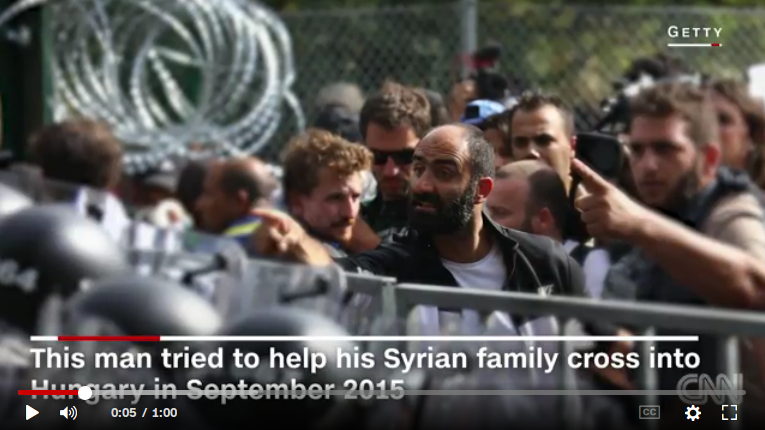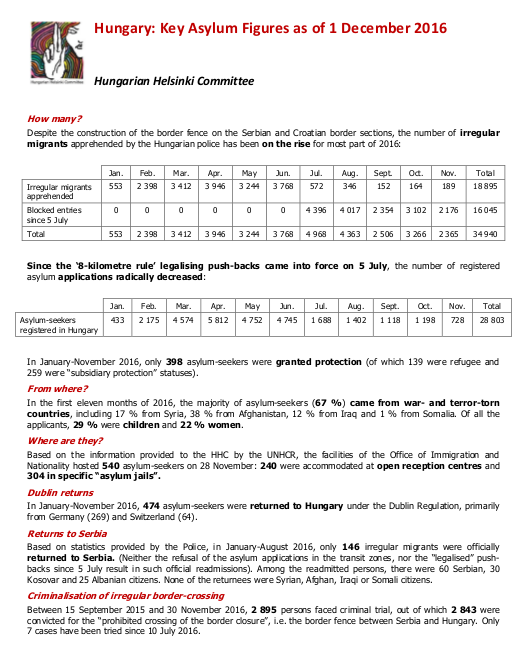The border policy of the Hungarian government has been successful in closing the border to most people seeking international protection. As a result, refugee camps and detention centers in Hungary are relatively empty and the media frenzy has subsided. The report of the Hungarian Helsinki Committee, however, shows that the number of people stopped from entering the country in irregular ways has increased since the beginning of the year. At the same time, the number of asylum requests has shrunk significantly since July when the 8 km law was introduced. This, of course, has consequences for activists and volunteers, who now operate in an environment where it is increasingly difficult to have direct contact with people seeking protection. This increases the vulnerability of people, because there is less information on which activists and volunteers can act. First and foremost, however, this has consequences in Serbia, where more and more people are getting stranded.
Alle Beiträge von ms
Aufgriff an der rumänisch-ungarischen Grenze
Hungary: Update on Dublin Transfers
From 1 January till 27 November 2016, 25.552 transfer requests had been communicated to Hungary from other Member States and in 474 cases asylum-seekers had been successfully transferred to Hungary.
Incoming Requests: 11.279 – Successful Transfers: 269
Incoming Requests: 351 – Successful Transfers: 64
Incoming Requests: 8.734 – Successful Transfers: 237
Sweden:
Incoming Requests: 432 – Successful Transfers: 23
Denmark drops plans to send migrants to Hungary
Some 350 asylum seekers were told over the weekend that the Danish Immigration Service will not send them back to Hungary as previously suggested.
CNN: Syrian man jailed over Hungary border riot despite pleading for calm (+Video)
Thousands of refugees and migrants, most fleeing violence in the Middle East, mass at the sealed-off border, chanting „Open! Open!“ They are desperate to cross into Hungary, but a razor-wire fence, temporary blockade and a line of riot police stand in their way. As tensions escalate, one voice rises above the fray: A balding, bearded man, wearing a black and white tracksuit top, attempts to negotiate with the officers. „Nobody will make any problem to your country,“ he tells the officers at Horgos, near the town of Roszke, using a loudspeaker. „Nobody will make any problem to any policeman. You must understand this — we come here for peace, just to pass.“
Hungary: Key Asylum Figures as of 1 December 2016
ARD Panorama: Blutige Grenze – Wie die EU bei Ungarn wegsieht
Nach Grenzübertritten in Ungarn 10 Jahre Haft für Syrer
„Es tut mir sehr leid, wenn ich das Gesetz gebrochen habe. Aber ich fühle mich nicht schuldig. Ich bin kein Terrorist.“ Das waren die letzten Worte des Syrers Ahmed H. bevor ihn ein Gericht im südungarischen Szeged am Mittwochnachmittag zu einer Haftstrafe von 10 Jahren verurteilte.
Gerichtsurteil: Keine Abschiebungen von Asylbewerbern nach Ungarn
Asylbewerber dürfen einem Gerichtsurteil zufolge nicht nach Ungarn abgeschoben werden, weil ihnen dort eine unmenschliche Behandlung droht. Das Oberverwaltungsgericht Lüneburg stellte in seiner Entscheidung fest, dass die Asylverfahren in Ungarn mangelhaft seien. Flüchtlinge könnten dort unter anderem ohne Prüfung von Gründen inhaftiert werden. Die Richter bestätigten ein Urteil der Vorinstanz, gegen das das Bundesamt für Migration und Flüchtlinge Rechtsmittel eingelegt hatte.
Amnesty International: How a family man in Cyprus ended up in a Hungarian jail cell accused of ‘terrorism’
One summer’s evening last year Ahmed was at home in Cyprus with his wife Nadia and their young children when he received the call that would turn his life upside down. “It was his mother calling from Syria,” Nadia recalls. “She told him there was a lull in the bombing of their town and that they were leaving. They needed help.” The call set in motion a chain of events that would land Ahmed where he is today: locked in a Hungarian jail charged with an “act of terror”.




